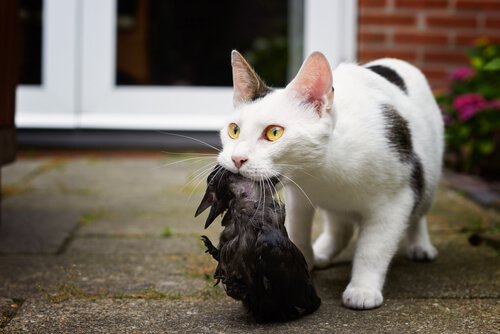How Exactly Do Cats Learn to Hunt?

Wild cats hunt out of instinct, because they have to find their own food or otherwise they’ll starve. But what about domestic cats? They don’t seem to instinctively know how to hunt because it’s not a question of survival for them. So how exactly do house cats learn how to hunt? What can you do to stimulate their instincts?
How do cats learn to hunt?
A house cat’s mother is the one responsible for teaching it how to develop its hunting instincts. Kittens learn the basics of hunting when they’re about five weeks old, round about when they start to walk by themselves. They do this by watching how their mother does it.
Not only will she catch her prey and eat it in front of her litter, but she’ll also make noises to get their attention. Then, she’ll bring her prey towards her kittens, and that’s when she’ll start to eat it. The kittens will start to play with the prey, and, after a while, they’ll start to go off hunting on their own.
Hunting becomes more than just a game
At about eight weeks old, the kittens will stop playing with their prey and start to act like true hunters. Once they start hunting for real, it becomes more than just a game to them. Having said that, once they’ve caught and eaten their prey, they’ll go right back to playing happily with their siblings.
How to encourage your cat to hunt
Some kittens don’t have the chance to learn the basic concepts of hunting from their mother. However, you might want your cat to learn how to do it. There are some activities and games which involve chasing after fake prey, and you can use these to help them develop their hunting skills.

How cats hunt
When cats first learn to hunt, they develop a very precise, neat technique. Firstly, they locate their prey. Then, they start to approach it, usually low to the ground and moving slowly. That way their prey doesn’t notice them. Once they’ve gotten close enough, they’ll lean back on their paws and make their leap to capture their prey.
Cats are “equipped” with a very sharp sense of hearing. They can pick out every noise or ultrasound that their prey may make. In some cases, they can even hear their prey from miles away.
When your cat or kitten first starts hunting, you shouldn’t let it go too far away. One option is to use one of the products that allows you to track them. Your cat might have been gone a long time and you’ll want to find it to make sure it’s safe.
Cats also have good enough sight to make a connection between sound and image. Smell doesn’t seem to play as big a role as most people would think. Their sense of taste works alongside their other senses to help them pick out the tastiest prey instead of bitter insects.
Hunting is natural and controversial
Cats and their desire to hunt has been helpful to us for a long time, because they keep the rodent population in check. At the same time, cats being predators has never been a more controversial topic than it is right now.

When cats do what’s in their nature – hunting – it can lead to intense debates, especially when they prey on birds.
It’s worth mentioning that some biologists say that wild cats mainly scavenge for their food, and that hunting is only a small part of their diet. They also say that when these cats do hunt, they usually go after rats, and not rare birds.
But one bird is always one too many in the eyes of animal lovers. So, the debate about cats being allowed to hunt freely or not probably won’t die down in the near future. That debate will probably also extend to whether or not it’s okay to keep cats indoors all the time.
Hunting fish
Fishing also takes a lot of skill and patience. Cats normally wait in a spot and watch from a distance until their ideal prey shows up. Then, they’ll use their paws like a spoon to grab the fish out of the water. If the water is shallow enough, they can even use both paws to grab one.
Not all cats are good at fishing, because not being able to see as well through the water makes it much harder. But some cats, even ones that don’t live near water, have learned to use that spoon technique to “fish” out a nice treat from the holes they find around them.
All cited sources were thoroughly reviewed by our team to ensure their quality, reliability, currency, and validity. The bibliography of this article was considered reliable and of academic or scientific accuracy.
https://docandphoebe.com/blogs/the-catvocate-blog/hunting-a-learned-skill-from-mother-by-the-kitten
This text is provided for informational purposes only and does not replace consultation with a professional. If in doubt, consult your specialist.